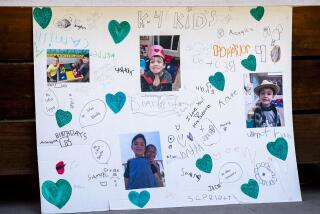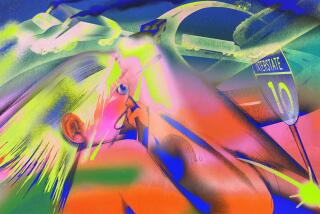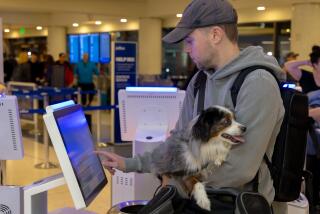Driving Home the Concept of Peace--on Earth and Its Roads
- Share via
According to my husband, we are entering the season of driving hell. Granted, he made this proclamation after an 8:30 p.m. Thanksgiving eve emergency trek in search of two 12-ounce cans of Carnation evaporated milk, which took him to three supermarkets and one corner grocery. Filled with the warmth of the holiday season at that particular moment he was not.
“During the holidays,” he said, “people are either driving to their families, where they probably don’t want to be, or to the mall, where they definitely don’t want to be, so they’re anxious and tense. Everyone knows the suicide rate is higher in the weeks between Thanksgiving and just past New Year’s. People who are contemplating suicide are not, as a rule, great drivers.”
Fa la la la la.
Rather than deconstruct the implications of my mate’s association of family with anxiety, I chose to concede that he had a point. We all know the superlatives--Thanksgiving is the biggest travel weekend of the year, the day after Thanksgiving the biggest shopping day, both kicking off a month of shopping excursions and holiday parties, with their accompanying surface-street gridlock and sobriety checkpoints.
And there is a chilling irony about watching people of many races suddenly able to communicate with perfect clarity, usually through certain hand gestures, over the potential ownership of a parking space while “O Holy Night” blares from loudspeakers on high.
As it turns out, my husband’s fear of being broadsided by a potential suicide is probably unfounded. The number of self-inflicted deaths actually decreases between Thanksgiving and Christmas; they peak on New Year’s Eve and Day, according to various surveys.
Nonetheless, people are not at their driving best during these weeks, says Robert Maurer, a psychologist at UCLA’s School of Medicine.
“Whatever spiritual aspect the holidays have is hard for people to hold onto,” he says. “Instead it becomes a time of self-indulgence. Add to that the obvious risk factors of more drinking and more drivers on the road and yes, I would say people’s driving gets worse.”
Yet Maurer believes the car is one of the best places to learn the lessons of the season--peace on Earth, goodwill and all that. In fact, he teaches his patients stress-reduction techniques to be used specifically when driving.
“The first thing I tell them is that every time they get in the car, they should do one favor for another driver,” he says, crediting a team of San Francisco cardiac researchers with his suggestions. “It changes your focus away from thinking ‘that s.o.b. is trying to cut me off’ to helping others attain their goals.”
He also encourages deep breathing, listening to classical music rather than “something that will get you revved up,” composing a list of things you are grateful for, and eschewing cell phone use, which is dangerous.
“And always assume the driver in the next car is from out of town, overwhelmed by the insanity of Los Angeles.”
The major reason people get upset while driving, he explains, is that too many of us begin our mornings making a list of things we must do in order to feel good about ourselves. On the road we see other drivers as anonymous obstacles between us and our lists.
“No one comes to me seeking to be a better driver,” he says. “They want to be better partners or parents or people. But if you can’t be generous while sitting in a comfortable seat, listening to the radio, controlling your destination, you won’t be able to be generous in a relationship.”
And if we can’t be generous during the holidays when much of our extra travel time is due to participation in traditions of love and celebration, then maybe we had better just stay home.
Mary McNamara can be reached by e-mail at mary.mcnamara@latimes.com.
More to Read
Sign up for The Wild
We’ll help you find the best places to hike, bike and run, as well as the perfect silent spots for meditation and yoga.
You may occasionally receive promotional content from the Los Angeles Times.







